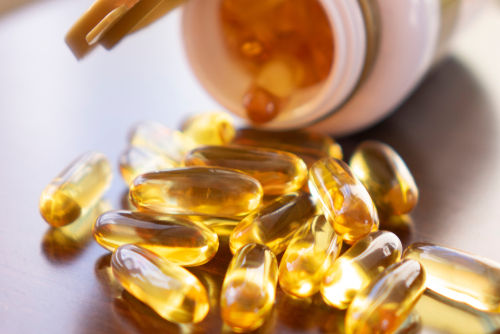General Health
FAQs on Vitamin D, the Sunshine Vitamin
6 min read
By Apollo 24/7, Published on - 22 October 2021, Updated on - 16 January 2024
Share this article
7
0 like

Vitamin D, also called calciferol, is a fat-soluble vitamin, which means it requires fat to get absorbed in the body. It is barely found in natural foods but can be produced in the body. The skin contains the precursor of vitamin D, which gets activated on getting exposed to the ultraviolet (UV) rays of the sun. Vitamin D is both a nutrient and a hormone that is necessary to maintain the health of bones and other vital organs.
Let us address some of the frequently asked questions about this essential nutrient.
1. What is the function of vitamin D?
Vitamin D is one of the most important vitamins needed by our body to stay healthy. Some of the functions of vitamin D include:
- Absorption of calcium and phosphorus in the body.
- Prevention of bone diseases such as rickets and osteomalacia that makes the bones weak and soft.
- Maintaining the functioning of parathyroid glands. Parathyroid glands maintain the calcium levels in the blood by interacting with the kidneys, gut, and skeleton.
- Prevention of unwanted contraction of muscles, which results in cramps and spasms.
- Carrying out several necessary processes in the body such as inflammation reduction, cell growth, proper functioning of the immune system, and glucose metabolism.
Studies have also shown that getting the required amount of vitamin D can help in preventing and treating several health conditions such as high blood pressure, diabetes, infections, cardiovascular diseases, multiple sclerosis, and some types of cancers such as colon, prostate, and breast cancer.
Recommended Read: How Does Vitamin D Benefit People with Diabetes?
2. How much vitamin D is required by the body in a day?
The recommended daily allowance of vitamin D is 5 micrograms (mcg) for children and 5 to 15 mcg for adults. During pregnancy and lactation, women require 5 mcg of vitamin D along with regular exposure to sunlight. Vitamin D is also expressed in International Units (IU), where 1 microgram of vitamin D is equal to 40 IU.
The human skin can make vitamin D by getting exposed to sunlight. However, prolonged exposure to UV radiation can be harmful to the skin and may result in skin cancer. Therefore, it is ideal to obtain the required vitamin D from food and supplements.
3. What are the natural sources of vitamin D?
Vitamin D can be synthesised by the skin on exposure to sunlight. Furthermore, some foods naturally have traces of vitamin D3:
- Fatty fishes such as salmon, swordfish and tuna
- Egg yolks
- Cheese
- Cod liver oil
- Beef liver
- Mushrooms (they have high amounts of vitamin D2)
- Vitamin D-fortified dairy products, cereals and juices
4. What happens in vitamin D deficiency?
Lack of vitamin D in the diet, poor absorption, increased demand, and insufficient exposure to sunlight are the most common reasons for vitamin D deficiency. Prolonged vitamin D deficiency can result in:
- Rickets: Rickets is a condition that affects the development of bones in infants and children. It can result in soft bones, skeletal deformities, pain, developmental delay, seizures, prolonged body contractions (tetanic spasms), dental abnormalities, and cardiomyopathy (a disease affecting the heart muscles).
- Osteomalacia: Osteomalacia causes the weakening of bones in adolescents and adults due to the lack of proper mineralization. It can result in bone deformities, pain, fatigue, muscle weakness, seizures, tetanic spasms, and even depression.
5. Who is more likely to develop vitamin D deficiency?
Anyone can develop vitamin D deficiency but people who could be at increased risk include:
- Infants who have been breastfed for a long time: Breast milk has an insufficient amount of vitamin D and therefore, infants are prone to vitamin D deficiency.
- Older people: With age, the ability of the skin to synthesize vitamin D reduces, putting old people at increased risk of developing vitamin D deficiency.
- People with limited sun exposure: People who rarely step out from their houses/ workplaces or cover themselves completely for religious or personal reasons are at increased risk of developing vitamin D deficiency.
- People who cannot absorb fat: People suffering from conditions such as cystic fibrosis, liver disease, celiac disease, Crohn’s disease, ulcerative colitis or undergone gastric surgery are unable to absorb dietary fat efficiently. Since vitamin D is a fat-soluble vitamin, the lack of fat in the body can further reduce its absorption in the body, resulting in a deficiency.
- People with darker skin: People with dark skin have high amounts of melanin pigment in the outer layer of their skin, which reduces their ability to produce vitamin D from sunlight.
6. Who should take vitamin D supplements?
It can be difficult to achieve the required amount of vitamin D from natural food sources and sun exposure alone. Therefore, people may require vitamin D supplements to meet their needs. However, one must not take any supplements without consulting the doctor as it can result in toxicity.
Explore a Range of Vitamin D Supplements
7. What precautions should be taken before taking vitamin D supplements?
Vitamin D supplements can interact with several medications and affect their functioning, therefore it is advised to consult a doctor before taking any supplements. Some of these medications include:
- Weight loss medication: Orlistat is a gastrointestinal lipase inhibitor that blocks the absorption of fat, thereby promoting weight loss. However, it can reduce the absorption of vitamin D from food and supplements, resulting in a deficiency.
- Statins: The internal vitamin D (present in the skin) is derived from cholesterol. Since statins are cholesterol-lowering agents, they can reduce the production of vitamin D in the body.
- Steroids: Corticosteroid medications, such as prednisone, are often prescribed to reduce inflammation in the body but they can decrease the absorption of calcium and impair vitamin D metabolism.
- Diuretics: Thiazide diuretics help in treating hypertension by reducing the calcium release in the urine. However, when consumed along with vitamin D supplements, they can result in hypercalcemia, which is the increased amount of calcium in the blood.
8. Can excess consumption of vitamin D cause toxicity?
Excess vitamin D can increase the absorption of calcium in the gastrointestinal tract. Excessive absorption of calcium can cause vitamin D toxicity and result in hypercalcemia and hypercalciuria (increased calcium in the urine). Hypercalcemia can lead to nausea, vomiting, pain, muscle weakness, loss of appetite, dehydration, frequent urination (polyuria), excessive thirst, and kidney stones. In severe vitamin D toxicity, the affected person may suffer from renal failure, soft tissue calcification, cardiac arrhythmias (irregular heartbeat) and even death.
Conclusion
It is important to make sure that vitamin D is being taken in adequate amounts to keep the body functioning well. Vitamin D not only helps in making the bones strong but can also prevent heart disease and even some cancers. People with vitamin D deficiency may experience pain, weakness, fatigue, and mood changes. One must consult their doctor regarding the foods and supplements that can help maintain the required vitamin D levels in the body. For expert advice,
Medically reviewed by Dr Sonia Bhatt.
General Health
Consult Top Orthopaedicians
View AllLeave Comment
Recommended for you
%20(2).jpg?tr=q-80)
General Health
Thyroid Normal Value in Female: Common Symptoms of Abnormal Thyroid Levels
Learn about thyroid normal values in females, common symptoms of thyroid disorders, and essential tests for diagnosis. Stay informed for better thyroid health.

General Health
Are You At Risk Of A Heart Disease? This Simple Test Can Say
A lipid profile test is a blood test that helps measure the levels of cholesterol and other fats in the body. Physicians use the test results to assess the risk of heart disease.

General Health
5 Important Vaccines That Young Adults Must Not Skip
Vaccines aid in the development of immunity and provide protection against some serious diseases. As a child, you might have received many vaccinations, but as adults, there are a few vaccines that you must not skip.
Subscribe
Sign up for our free Health Library Daily Newsletter
Get doctor-approved health tips, news, and more.
Visual Stories

Plant-based Foods That Are a Great Source of Iron
Tap to continue exploring
Recommended for you
%20(2).jpg?tr=q-80)
General Health
Thyroid Normal Value in Female: Common Symptoms of Abnormal Thyroid Levels
Learn about thyroid normal values in females, common symptoms of thyroid disorders, and essential tests for diagnosis. Stay informed for better thyroid health.

General Health
Are You At Risk Of A Heart Disease? This Simple Test Can Say
A lipid profile test is a blood test that helps measure the levels of cholesterol and other fats in the body. Physicians use the test results to assess the risk of heart disease.

General Health
5 Important Vaccines That Young Adults Must Not Skip
Vaccines aid in the development of immunity and provide protection against some serious diseases. As a child, you might have received many vaccinations, but as adults, there are a few vaccines that you must not skip.

